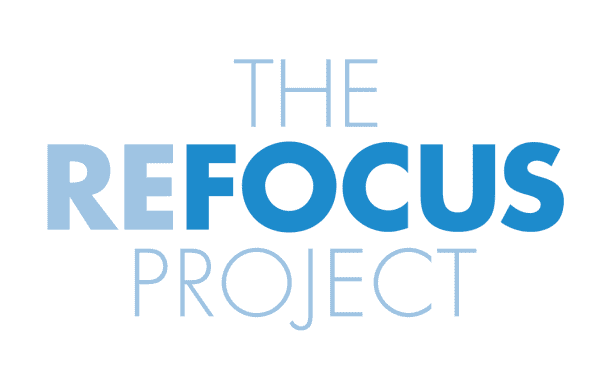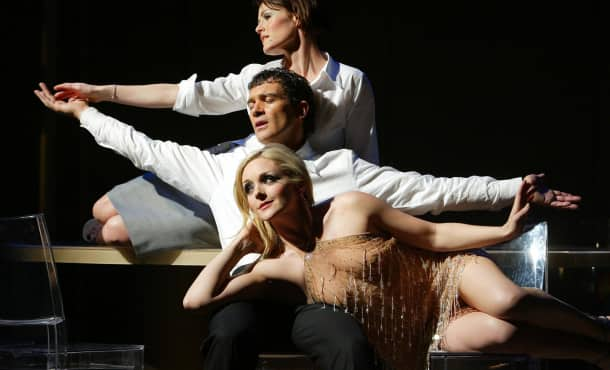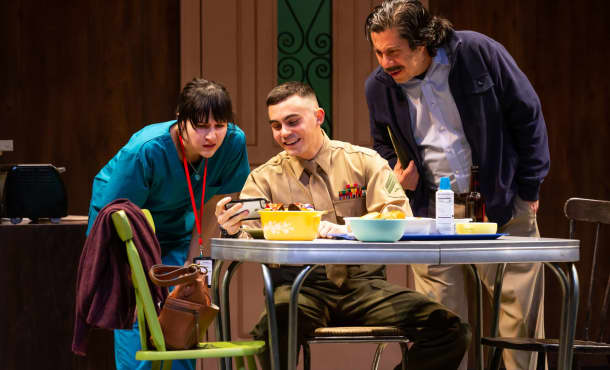Jump to:
Our Mission • Our Work • Our Values and Vision • Our Commitment • Our Land Acknowledgment
Our Mission
Roundabout celebrates the power of theatre by spotlighting classics from the past, cultivating new works of the present, and educating minds for the future.
OUR WORK
We produce familiar and lesser-known plays and musicals with the ability to take artistic risk as only a not-for-profit can.
We discover talented playwrights and provide them long-term artistic support to contribute to the future of the theatrical canon.
We reduce the barriers—financial, physical and cultural—that can inhibit theatergoing.
We collaborate with a diverse team of artists to identify programming for consideration.
We build transformational education experiences that enhance teacher practice, deepen student learning, and ignite the futures of young people through career training and placement.
We capture and archive over five decades of production history as an open resource for artists, scholars, and our community.
View the full impact of our programs.
OUR VALUES AND VISION
As we begin to transform our institution, we acknowledge our responsibility for perpetuating and, now, correcting injustices in our industry and for building an American theatre that thrives on diversity. The following principles comprise the core of our strategies—from our internal practices, to our public-facing work, to our behavior within our community. They apply to Roundabout’s administrative and production staffs, leadership, board, artists, educators, donors, students, and audiences. We live and promote these values:
EQUITY. We work to dismantle all forms of systemic oppression. We mandate anti-racism and inclusion in our workplaces, in our programming, and among our stakeholders.
CREATIVITY. We produce theatre and build programs that create a dialogue between past and present, and between art and audiences, while prioritizing innovation and advocacy as only a not-for-profit can.
COLLABORATION. We promote communication and transparency as essential for a caring workplace and for every staff member—and the company as a whole—to reach their potential.
LEARNING. We practice a culture of learning, for ourselves, for our communities, and for the evolution of our field. Our institution and our industry will grow only from an ongoing and open exchange of ideas.
BELONGING. We reflect and impact our city by making our workspaces and our shows welcoming and accessible to all as we build trusting and lasting relationships.
ACCOUNTABILITY. We charge ourselves and our stakeholders at all levels to embrace and demonstrate these principles, and encourage our peers and our public to hold us responsible as we move towards a just and inclusive future.
OUR COMMITMENT
After a company-wide assessment and discussion process that Roundabout began in October 2019, our 29-staff-member Transformation Team created a five-year plan to center equity, diversity, inclusion, and anti-racism (EDI/AR) in our structures and actions.
With the robust support of our management and Board, we commit to these practices and to the understanding that their success will be defined not by intentions but by outcomes.
Here are our actions items of the August 2021 plan:
OUR LAND ACKNOWLEDGMENT
Roundabout Theatre Company acknowledges that our theatres and offices sit on the traditional land of the Lenape Nation People of Mannahatta, translated to, Island of Many Hills.
For many generations, these Native Americans lived, worked, and created art on this land for which they were the traditional caretakers.
Other Nations that have passed through and/or relocated to the area are Mohawk, Oneida, Onondaga, Cayuga, Seneca, Tuscarora, Abenaki, Munsee, Mohegan, Montauk, Shinnecock, Mohican, and Wappinger Tribes.
We pay respect as we share our productions on their ancestral land, celebrate the many Native Peoples who are vibrantly thriving on and around Manhattan today, and commit to working toward establishing authentic relationships with these Indigenous communities.

Mission and Culture

The Refocus Project
The Refocus Project aims to transform the American theatre canon.

Digital Archives
Discover our rich history, search our records for your own research or just relive past productions.

Past Shows
Look back at our previous seasons of classic plays, new works and celebrated musical revivals.

Awards
Since 1965, Roundabout Theatre Company has been honored with many prestigious awards from the industry and media.

Our Blog
Read recent posts and announcements, latest interviews and explore the background of productions.

New Play Initiative
Supporting new work by gifted playwrights at all career stages with commissions, readings and workshops.

Artists in Residence Program
Providing artistic and financial support to early-career artists, giving them a theatre to call home.

Financial Information
See Roundabout's most recent Audited Financial Statement, IRS Form 990 and charity accreditation.


